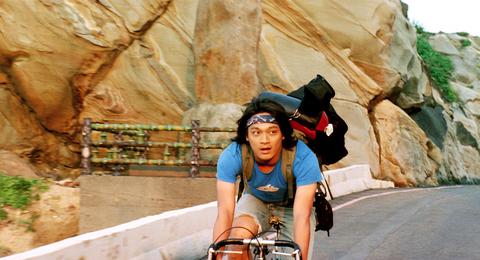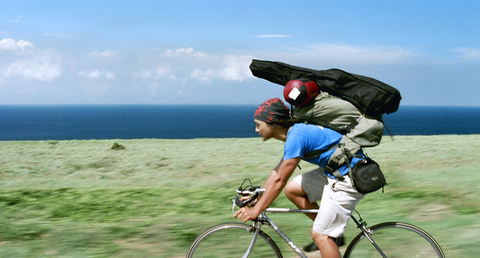A child of Taiwan's New Wave cinema, award-winning cinematographer En Chen (陳懷恩) has been a long-term collaborator of Hou Hsiao-hsien (侯孝賢) and has worked with acclaimed directors such as Chang Tso-chi (張作驥) and Cheng Wen-tang (鄭文堂) since the 1980s.
After more than 20 years of working at the center of Taiwan's film industry, the veteran cinematographer has decided to tell a story of his own with a scanty government subsidy and lots of supports from friends and money of his own. The end result is his feature debut Island Etude (練習曲), a road movie about Taiwan's past and present, it's beauty and sorrow and the stories of its inhabitants.
With guest appearances by novelist, playwright and filmmaker Wu Nien-jen (吳念真), theater veterans Deng An-ning (鄧安寧) and Yang Li-ying (楊麗音), TV personality Hsu Hsiao-shun (許效舜), musician Kimbo Hu (胡德夫) and others, the film is centered on a hearing-impaired college student named Ming-hsiang and the people and their stories he encounters during his seven-day, round-the-island bike trip. He travels through the scenic seaside landscape in Hulien (花蓮) and along the western coastal highway, passes through the Matsu pilgrimage (媽祖遶境) and a protest by elderly female workers protesting the unannounced closure of the factory in which they had worked for lifetime. The film takes audiences deep into the corners of the country and presents intimate portraits of people from different cultural, social and ethnic backgrounds, all of whom have their own stories to tell.

PHOTO: COURTESY OF CHI FEI FILM
As the writer, cinematographer and director, Chen makes a genuine effort to share his affection for the island and its people. The narrative is carried through Ming-hsiang's travels through different places, with the natural environment playing an important role and give the piece an unique rhythm and texture. In tune with the New Wave look and spirit, the travelogue ingenuously mixes history, myth, folk memories and contemporary issues of the country and its people.
Though some sections of the film seem over-produced and some less than articulate and rather dull, director Chen pulls off a human story about this diverse country. As the real-life round-the-island biker who inspired Chen to make the film said: "there is something that if you don't do it now, you will never do it for the rest of your life." Chen has certainly grasped the chance to realize his dream and has done a commendable job.

PHOTO: COURTESY OF CHI FEI FILM

Towering high above Taiwan’s capital city at 508 meters, Taipei 101 dominates the skyline. The earthquake-proof skyscraper of steel and glass has captured the imagination of professional rock climber Alex Honnold for more than a decade. Tomorrow morning, he will climb it in his signature free solo style — without ropes or protective equipment. And Netflix will broadcast it — live. The event’s announcement has drawn both excitement and trepidation, as well as some concerns over the ethical implications of attempting such a high-risk endeavor on live broadcast. Many have questioned Honnold’s desire to continues his free-solo climbs now that he’s a

As Taiwan’s second most populous city, Taichung looms large in the electoral map. Taiwanese political commentators describe it — along with neighboring Changhua County — as Taiwan’s “swing states” (搖擺州), which is a curious direct borrowing from American election terminology. In the early post-Martial Law era, Taichung was referred to as a “desert of democracy” because while the Democratic Progressive Party (DPP) was winning elections in the north and south, Taichung remained staunchly loyal to the Chinese Nationalist Party (KMT). That changed over time, but in both Changhua and Taichung, the DPP still suffers from a “one-term curse,” with the

Jan. 26 to Feb. 1 Nearly 90 years after it was last recorded, the Basay language was taught in a classroom for the first time in September last year. Over the following three months, students learned its sounds along with the customs and folktales of the Ketagalan people, who once spoke it across northern Taiwan. Although each Ketagalan settlement had its own language, Basay functioned as a common trade language. By the late 19th century, it had largely fallen out of daily use as speakers shifted to Hoklo (commonly known as Taiwanese), surviving only in fragments remembered by the elderly. In

Lines between cop and criminal get murky in Joe Carnahan’s The Rip, a crime thriller set across one foggy Miami night, starring Matt Damon and Ben Affleck. Damon and Affleck, of course, are so closely associated with Boston — most recently they produced the 2024 heist movie The Instigators there — that a detour to South Florida puts them, a little awkwardly, in an entirely different movie landscape. This is Miami Vice territory or Elmore Leonard Land, not Southie or The Town. In The Rip, they play Miami narcotics officers who come upon a cartel stash house that Lt. Dane Dumars (Damon)